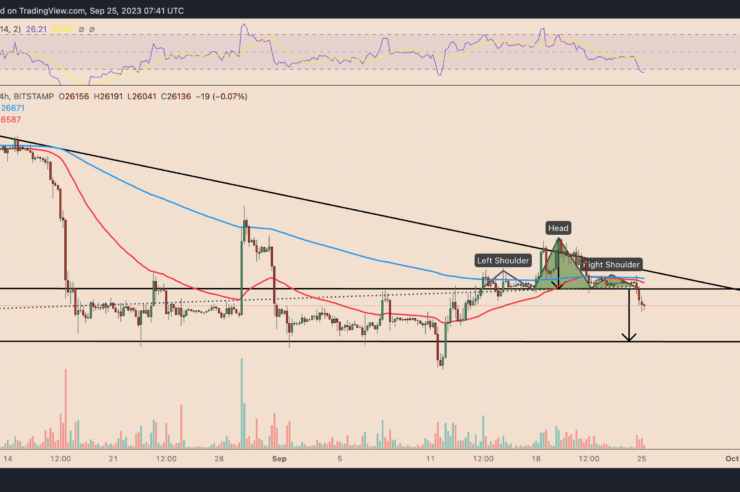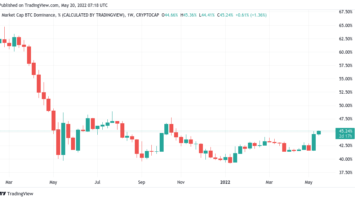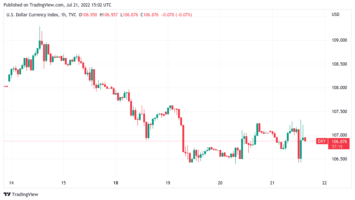The price of Bitcoin (BTC) is holding above $26,000 on Sept. 25, continuing to show weakness after last week’s United States Federal Reserve interest rate decision.
Will the Fed push Bitcoin price lower?
On Sept. 21, Fed officials decided to keep interest rates unchanged. However, projections released after the Fed meeting showed that most officials favor increasing rates one more time in 2023. BTC price is down 4.25% since.

Higher interest rates have proven to be bearish for non-yielding assets like Bitcoin recently.
Instead, they have helped raise investors’ appetite for safer assets like the U.S. dollar.
As a result, the 20-day average correlation coefficient between Bitcoin and the U.S. Dollar Index (DXY) has dropped to -0.73, the lowest since September 2022, suggesting an increasingly inverse relationship.

On the other hand, the bulls are pinning their hopes on the U.S. Securities and Exchange Commission (SEC) possibly approving a spot Bitcoin exchange-traded fund (ETF) in October. The biggest argument is that the approval of the first gold ETF in 2003 saw gold prices skyrocket over 300% in the following years.
These factors have offset each other, producing one of Bitcoin’s least volatile periods in history. Bitcoin’s historical volatility index — a metric that measures BTC price volatility at one-minute intervals for 30 minutes — has dropped to 13.39 this month.
By comparison, the index’s peak was 190 in February 2018.

Long-term Bitcoin sentiment stable
Nevertheless, the Fed’s hawkishness has done little to shake the sentiment of Bitcoin long-term holders (LTH) based on the net unrealized profit/loss (NUPL) reading (the blue area in the chart below).
Any NUPL value above zero indicates that the network is enjoying an overall net profit, whereas values below zero imply that the network is facing net losses. Currently, BTC investors holding their tokens for over 155 days have remained profitable throughout 2023.
In other words, most LTH entities have not sold their BTC holdings yet in 2023 and are likely expecting a higher Bitcoin price in the future.

Conversely, the NUPL (the red area) of short-term holders (STH), which typically react swiftly to market volatility, has declined sharply in 2023. This suggests STHs or “speculators” have been securing their profits and accumulating BTC at higher prices.
Bitcoin trading pundits: BTC bull run ahead
Meanwhile, multiple Bitcoin chart analysts anticipate BTC to go on an extended bull run in late 2023 and throughout 2024.
For instance, pseudonymous analyst Rekt Capital sees Bitcoin’s ongoing flat trend as a buying opportunity ahead of the Bitcoin halving by mid-2024. Previous halving events have all served as bullish catalysts, the analyst argues.

Similarly, popular market analyst Moustache cites a classic Megaphone pattern to predict a bull run in the Bitcoin market, with upside projections above $100,000.

Short-term bearish bias
However, in the shorter term, Bitcoin price technicals are flashing a warning as a potential head-and-shoulders (H&S) pattern emerges.
An H&S pattern forms when the price forms three peaks in a row atop a common support line (called neckline). The middle peak, called the head, is higher than the other two peaks: the left and the right shoulders.
Related: Bitcoin fails to recoup post-Fed losses as $20K BTC price returns to radar
The H&S pattern resolves after the price breaks below the neckline and falls to the level at length equal to the maximum height between the head and the neckline. As shown below, Bitcoin has started breaking down below its neckline level of around $26,420.

As a result of this classic technical setup, the bearish target for BTC price sometime in October will be around $25,400.
This article does not contain investment advice or recommendations. Every investment and trading move involves risk, and readers should conduct their own research when making a decision.






















Comments (No)